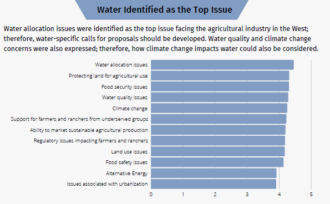Western SARE has always strived to meet the needs of our region’s agricultural communities. Toward that end, we recently funded a needs assessment to better understand information gaps and future directions for research and outreach efforts related to sustainable agriculture in our region. The study also aimed to understand the regional differences that may exist across the diverse landscape of the Western U.S.
The Administrative Council and staff will use the results as we move into strategic planning efforts.
A team of researchers led this effort, reaching out to Extension educators, non-profits, and non-governmental agencies. Overall, 1,187 participants responded to the survey, corresponding to a 25% response rate, with Extension personnel representing the majority of the responses. Most of the respondents worked with small-scale producers (< $350,000 annual gross cash farm income), with more non-Extension respondents working with large-scale producers (> $1,000,000 annual gross farm income).
Respondents identified water allocation issues as the most important topic relative to sustainable agriculture to be addressed in their geographic location. However, other topical areas were identified as areas to be addressed, including protecting land for agricultural use, food security, water quality, climate change, support for farmers and ranchers from underserved groups, ability to market sustainable agricultural production, regulator issues, land use, food safety, alternative energy, and issues associated with urbanization.
The data indicated differences in issues identified as needing to be addressed based on clientele group. One indication is that those respondents working with subsistence producers and producers from underrepresented groups identified the ability to market sustainable agricultural products as being the largest need to be addressed. And respondents working with organic producers indicated climate change was the most important need to be addressed. For respondents working with mid-scale and large-scale producers, regulatory issues that impact farmers and ranchers and water allocation issues were at the top of the list of issues to be addressed.
An underlying theme of the data indicated that a larger focus on the economic component of sustainable agricultural production practices should be a priority. Respondents indicated that major barriers to adoption of sustainable agricultural practices include the potential for financial loss, as well as insecurity surrounding perceived risk and time. To address this concern, a larger focus on the economic component of sustainability could be emphasized by Western SARE.
Response from the Pacific Islands indicated a large perceived impact of Western SARE in the region, but also brought to light the barriers those areas have relative to access to technology, the impact of culture, and language that inhibit the quality and types of proposals from these regions. The survey revealed that the dollars spent in the Pacific Island areas have a large impact and providing grant writing support and resources may be valuable to support the impact.
Further, the survey identified generational differences among respondents, such that the younger respondents are more racially diverse than older respondents and had a larger concern for support for farmers and ranchers from underrepresented groups. Understanding the demographic differences among younger generations working in sustainable agriculture and investing in their careers is important for the future of work in the field.
Multifaceted and meaningful data was captured by this effort that will provide guidance to Western SARE to most effectively allocate resources and better serve the needs of sustainable agriculture in the Western U.S.
